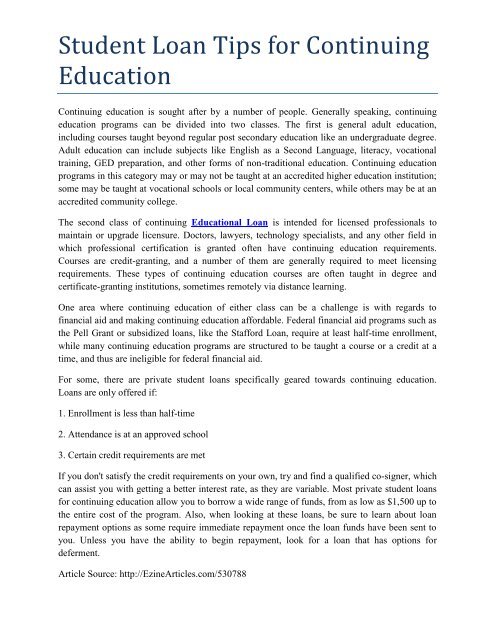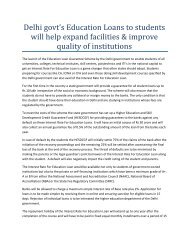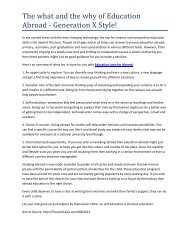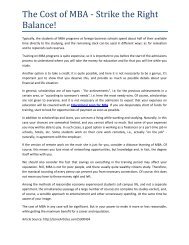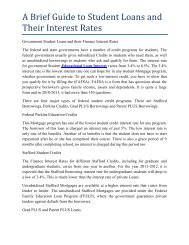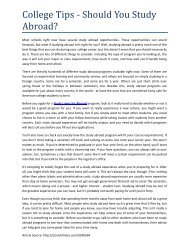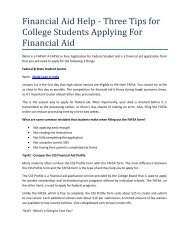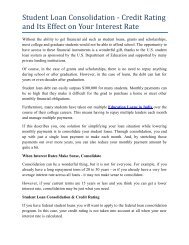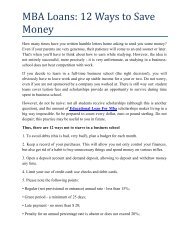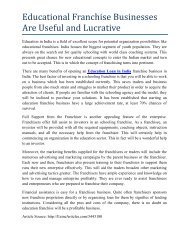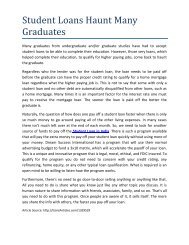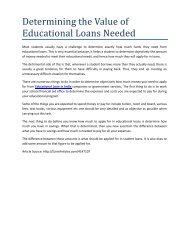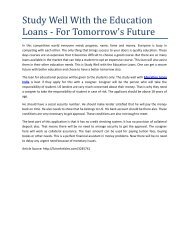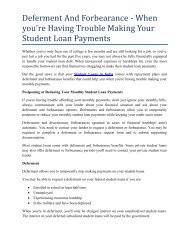You also want an ePaper? Increase the reach of your titles
YUMPU automatically turns print PDFs into web optimized ePapers that Google loves.
<strong>Student</strong> <strong>Loan</strong> <strong>Tips</strong> <strong>for</strong> <strong>Continuing</strong><br />
<strong>Education</strong><br />
<strong>Continuing</strong> education is sought after by a number of people. Generally speaking, continuing<br />
education programs can be divided into two classes. The first is general adult education,<br />
including courses taught beyond regular post secondary education like an undergraduate degree.<br />
Adult education can include subjects like English as a Second Language, literacy, vocational<br />
training, GED preparation, and other <strong>for</strong>ms of non-traditional education. <strong>Continuing</strong> education<br />
programs in this category may or may not be taught at an accredited higher education institution;<br />
some may be taught at vocational schools or local community centers, while others may be at an<br />
accredited community college.<br />
The second class of continuing <strong>Education</strong>al <strong>Loan</strong> is intended <strong>for</strong> licensed professionals to<br />
maintain or upgrade licensure. Doctors, lawyers, technology specialists, and any other field in<br />
which professional certification is granted often have continuing education requirements.<br />
Courses are credit-granting, and a number of them are generally required to meet licensing<br />
requirements. These types of continuing education courses are often taught in degree and<br />
certificate-granting institutions, sometimes remotely via distance learning.<br />
One area where continuing education of either class can be a challenge is with regards to<br />
financial aid and making continuing education af<strong>for</strong>dable. Federal financial aid programs such as<br />
the Pell Grant or subsidized loans, like the Staf<strong>for</strong>d <strong>Loan</strong>, require at least half-time enrollment,<br />
while many continuing education programs are structured to be taught a course or a credit at a<br />
time, and thus are ineligible <strong>for</strong> federal financial aid.<br />
For some, there are private student loans specifically geared towards continuing education.<br />
<strong>Loan</strong>s are only offered if:<br />
1. Enrollment is less than half-time<br />
2. Attendance is at an approved school<br />
3. Certain credit requirements are met<br />
If you don't satisfy the credit requirements on your own, try and find a qualified co-signer, which<br />
can assist you with getting a better interest rate, as they are variable. Most private student loans<br />
<strong>for</strong> continuing education allow you to borrow a wide range of funds, from as low as $1,500 up to<br />
the entire cost of the program. Also, when looking at these loans, be sure to learn about loan<br />
repayment options as some require immediate repayment once the loan funds have been sent to<br />
you. Unless you have the ability to begin repayment, look <strong>for</strong> a loan that has options <strong>for</strong><br />
deferment.<br />
Article Source: http://EzineArticles.com/530788


